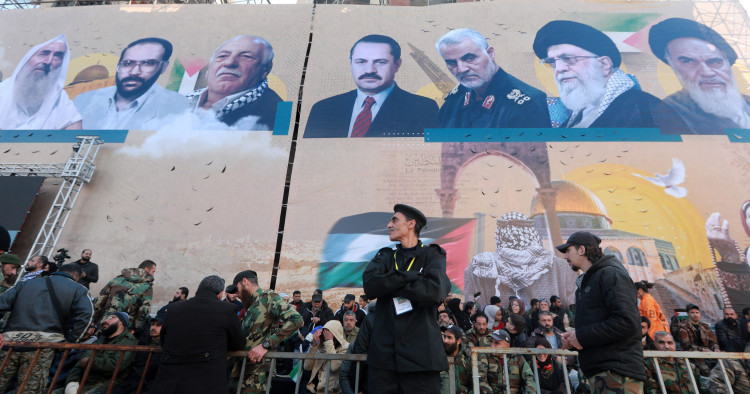The following article first appeared as part of MEI’s Expert Views special feature on how to end the war in Gaza.
Iran is a key stakeholder in the Israeli-Palestinian conflict. Tehran does not have a deciding vote on the outcome of the current war in Gaza, but it does have plenty of capacity to shape the future course of the conflict. Iran is, after all, among the top backers of Hamas, both in terms of diplomatic support and as a supplier of military materiel and knowhow.
There are two basic realities when it comes to understanding Tehran’s likely stance on a possible political process to end the conflict. First, the Islamic Republic’s rejection of Israel has been a core ideological pillar since 1979 and this is unlikely to change unless — and even then, only perhaps — there is a dramatic shift in Israeli-Palestinian relations for the better. Second, Iran’s current regional agenda, carried out via a network of pro-Iran Arab militant proxies, requires a common foe, and armed opposition to Israel serves that purpose.
For these two conditions to change, there needs to be a fundamental rethink in Tehran of what constitutes Iran’s key national interests, and that is highly unlikely as long as Supreme Leader Ayatollah Ali Khamenei and the first-generation senior commanders of the Revolutionary Guards are calling the shots. Still, it would be hard for Iran to maintain its rejectionist stance toward Israel if the rest of the Muslim world were able to engage the Jewish state in a meaningful political negotiation process that could lead to a two-state solution as a conclusion to the Israeli-Palestinian conflict.
As a point of departure, the depth of the Islamic Republic’s antipathy toward Israel has to be noted. When Islamists took over Tehran in 1979, the first foreign visitor was the head of the Palestine Liberation Organization (PLO), Yasser Arafat. He traveled to Tehran to meet the new Iranian leaders and strategize how to force Israel to meet Palestinian demands for a nation-state. But he quickly fell out with Ayatollah Ruhollah Khomeini once it became apparent that they faced an insurmountable disagreement over objectives.
The secular-nationalist PLO aimed to achieve a Palestinian state as its primary goal; Khomeini, by contrast, wanted the end of Israel under the banner of a pan-Islamic campaign led by Iran. He famously dismissed Arafat as a “traitor and idiot,” a remarkably prejudiced comment given that Khomeini had not once set foot on Palestinian soil. But then again, for Khomeini, the Palestinian question was much bigger than the plight of the Palestinian people.
Khomeini’s successor, Ayatollah Khamenei, remains faithful to that same pan-Islamic campaign. To be sure, over the last 45 years, Iran was not able to derail Israeli-Arab dialogue when it happened: It could not undermine the Camp David Accords (1978) or stop the Oslo Accords (1993, 1995), the Israel-Jordan peace deal (1994), or the Abraham Accords (2020). Most recently, Khamenei’s repeated calls since Oct. 7 for a comprehensive Islamic boycott of Israel has been more or less entirely ignored. The Islamic Republic’s categorical rejection of Israel’s right to exist is obviously seen by other regional states as a recipe for endless war.
Instead, Iran has had a far greater impact by acting as a supplier of weaponry during periods of Israeli-Palestinian armed conflict, when there is no prospect for a political process. Hamas, Palestinian Islamic Jihad, and other Arab movements like Hezbollah and the Houthis all owe their military prowess and capabilities to Iran.
And yet, just as Khomeini could not dictate to Arafat, Khamenei cannot dictate to Hamas, an organization that certainly does not consider Tehran its master but rather a useful source of assistance when few are willing to come to its aid. The bottom line is this: Iran and Hamas part ways on a fundamental question. Hamas has come to accept Israel as a reality and is willing to negotiate with it for a deal to end the Gaza war. Khamenei and the generals in the Revolutionary Guards at the core of the Axis of Resistance, who uphold Israel as the ultimate nemesis, have yet to come to this same acceptance.
Could Khamenei be incentivized to change course? In his 35 years as Iran’s ultimate leader, Khamenei has not once even hinted at what it would take for Iran to recognize Israel as a member of the United Nations and a reality of the Middle East. Therefore, as long as he is still alive, Tehran will stick to its policy of “strategic patience” and try to bleed Israel as much as possible but seek to avoid open war, as that, in Tehran’s eyes, would invariably mean fighting the Americans.
Until the Iranian leadership begins to see its rivalry with Israel as a geopolitical contest that can be settled and not as a sacrosanct religious mission, then Tehran cannot realistically be part of any Israeli-Palestinian political process. And whether it can be a spoiler in such a process very much depends on the strength of the Israeli and Palestinian/Arab commitment to a two-state solution.
Alex Vatanka is the director of the Iran Program at the Middle East Institute and a Senior Fellow with MEI’s Black Sea Program.
Photo by LOUAI BESHARA/AFP via Getty Images
The Middle East Institute (MEI) is an independent, non-partisan, non-for-profit, educational organization. It does not engage in advocacy and its scholars’ opinions are their own. MEI welcomes financial donations, but retains sole editorial control over its work and its publications reflect only the authors’ views. For a listing of MEI donors, please click here.












